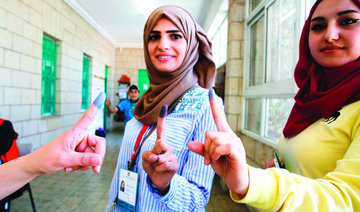GAZA CITY: In the last legislative elections, Muhammad Al-Astal voted for Muhammad Dahlan, a Fatah candidate in the city of Khan Yunis in the south of the Gaza Strip, against his own relative Yunus Al-Astal, a candidate for Hamas.
This time, Muhammad will again vote for Fatah in the elections scheduled for May 22, despite the presence of his relatives standing for other factions.
Now, long since the last elections in early 2006, 36 lists — seven party lists and the rest independents — are standing this time, but voters are exhausted by years of internal division.
Palestinians, by virtue of the Israeli occupation, are traditionally affiliated to parties or large segments of them with political tendencies that often decide their choice at the ballot box.
However, independent lists are betting on a change in voters’ moods due to what they call “years of wandering and political failure.”
Muhammad is one of those. He inherited an affiliation to Fatah from his father and brothers, and he believes that the party is “the most capable of leading the Palestinian people.”
The internal differences in Fatah, with the presence of three lists competing in the legislative elections, did not affect his position. He supports the official Fatah list formed by President Mahmoud Abbas.
“We should not be distracted, either in voting for candidates based on kinship, or for other lists. We need Fatah unity to complete the march of struggle and liberation from occupation,” Muhammad told Arab News.
With the factions at the Cairo Dialogue agreeing to adopt full proportional representation in the upcoming elections, instead of a mixed system (lists and individuals), a candidate’s personality is no longer a central factor in attracting voters.
Experts call voters such as Muhammad the “solid bloc,” which is made up of those who belong to political parties and whose votes are settled in favor of their party lists, and are not influenced by their tribe or geographical region. They do not pay attention to the electoral campaign.
Muhammad did not heed, in the last elections, any criticism of Dahlan, who has been leading the democratic reform movement since the decision to dismiss him from Fatah in 2018. This time, he has formed an independent electoral list, but Muhammad will not vote for him.
The Vision Center for Political Development polled experts and academics about voter priorities for a particular list, asking how do social upbringing, and the factors of belonging to social spaces such as family and tribe, or geographical space such as city and village, affect attitudes.
The poll concluded that “tribalism will not matter in these elections, and the priority will not be for the political program.” The decisive factor will be party affiliation, in addition to a list’s chances to provide on an economic level.
Samer Najm Al-Din, law professor at Hebron University in the West Bank, said: “Political affiliation will be the most prominent player in guiding the voter, and there is no Palestinian who is not intellectually framed.
“Unfortunately, the detailed electoral programs of the candidate blocs will not have a major role in influencing the voter. What may affect the voter’s orientation is the clear or broad headings of the electoral program, such as the adoption of resistance or economic prosperity, without paying attention to details. The electoral program that is based on clear, simplified ideas, appealing to the Palestinian with bright headlines, is the program that attracts the general electorate.”
Sania Al-Husseini, professor of political science and international relations at the Arab American University in Ramallah, said: “There is no doubt that the Palestinian scene is complex, especially at the current stage, and its priorities in voting for a list differ, depending on the economic and social situation, and so on.”
Regarding the conditions of social upbringing, and the factors of belonging to a family or tribe, Al-Husseini believes both will have an impact on the attitudes of voters, but the nature of the existing system limits these effects, because of the proportional voting system.
Political development researcher Thamer Sabaana believes that, based on opinion polls, factionalism will continue to play a key role in the results.
Hussam Al-Dajani, professor of political science at the Ummah University in Gaza, agreed that “belonging to the party is stronger than belonging to a tribe or geographical region,” but added that
“16 years of failure and political wandering will have a clear impact on the attitudes of the voters.”


























